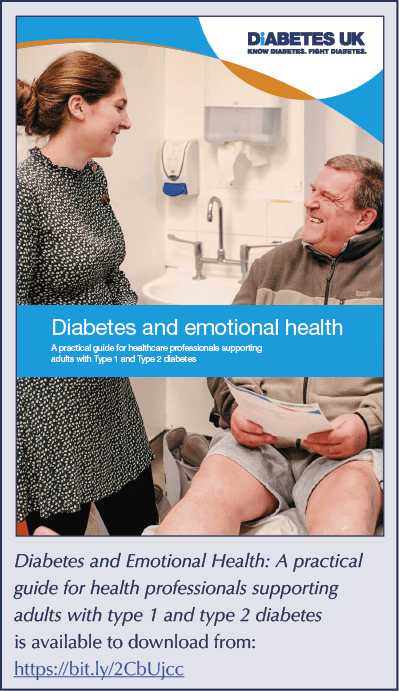Emotional health is as important as physical health in diabetes care, a fact we ignore at our peril. Recent years have seen great improvements in evidence relating to the emotional and psychological aspects of diabetes, for example diabetes-related distress (DD). DD is distress specific to the demands of living with diabetes, including medication-taking, social pressures and interactions with health professionals. It can lead to reduced diabetes self-care, missed appointments and worse physical health and quality of life.
DD can be measured simply and routinely using a reliable and valid questionnaire such as such as the Problem Areas in Diabetes (PAID) scale (Polonsky et al, 1995), and it is raised as an issue by one in four people with type 1 diabetes and one in five of those with type 2 diabetes who are on insulin (Speight et al, 2011). This is a large proportion of anyone’s clinic, education class or peer-support group. There are strategies which can be used to help reduce DD, as well as prevent it in the first place, and in turn to improve diabetes self-care, confidence and physical outcomes.
DD is one of the many topics covered in a brand-new, state-of-the-art guide for healthcare professionals from Diabetes UK (DUK). Diabetes and Emotional Health: A practical guide for health professionals supporting adults with type 1 and type 2 diabetes was launched on 6th March at the DUK Professional Conference, in a session attended by over 100 healthcare professionals and introduced by Chris Askew, CEO of DUK. The guide is now available on the DUK website at: https://bit.ly/2CbUjcc
Many healthcare professionals say they struggle to support people with their emotions, giving reasons that range from “We don’t have access to a psychologist” to “I’d rather not ask about emotions as I might do more harm than good”. These are completely understandable views. However, given what we now know about diabetes as an emotional and psychological condition as well as a physical one, we cannot avoid getting involved in this side of things any longer. The guide is now here to build our skills, give the evidence base and, actually, to be a really interesting read, with case studies and step-by-step guides to using the relevant questionnaires all included. In fact, one early reader of it, an individual living with diabetes, tweeted: “I started to read the resource on my commute in and got so absorbed I missed my stop!” You have been warned!
The guide is the UK edition of a handbook produced by Diabetes Australia in 2016. It was adapted by an expert group invited and coordinated by DUK, including, Jackie Sturt, Nicole de Zoysa, Mark Davies, Jen Bateman and myself. The guide is downloadable in its entirety as a PDF, so as to be available on any device; in addition, each chapter and the guide’s associated resources are provided via separate links on the DUK website. This means that healthcare professionals can develop their knowledge and expertise in the specific topics covered, according to their particular clinical needs and interests.
The chapters of the guide cover a comprehensive range of emotional-health topics related to living with diabetes, including DD, anxiety, depression, eating problems, psychological barriers to insulin use, fear of hypoglycaemia (and other specific fears) and referring to a mental health professional. In addition, there are chapters on communication and engagement, and facing life with diabetes. There is a consultation model, the 7As, to support best practice. In short, the guide contains everything a healthcare professional needs to be able to offer practical emotional help to the people they support.
Any diabetes health professional worth their salt aims to meet the expressed needs of people with diabetes. For many years, and especially recently, these have consistently included wishing that the feelings, emotions and demands of living with their condition were far better recognised and responded to by clinicians. Meeting this need is now approaching centre stage with the publication of this comprehensive guide and an upcoming campaign to accompany it. There is even a Psychologist Clinical Advisor being appointed by DUK to bring together the different strands of emotional health across the organisation, a most welcome development.
The guide shows us that there’s much we can do, not only to help with emotional issues but also to prevent them occurring in the first place. While we use it to gain ever more insight and build skills and confidence, it is worth remembering that simply acknowledging, in every clinical encounter we have, that life with diabetes is as emotional as it is physical, is incredibly important and valued, and will definitely do more good than harm.





Study provides new clues to why this condition is more aggressive in young children.
14 Nov 2025